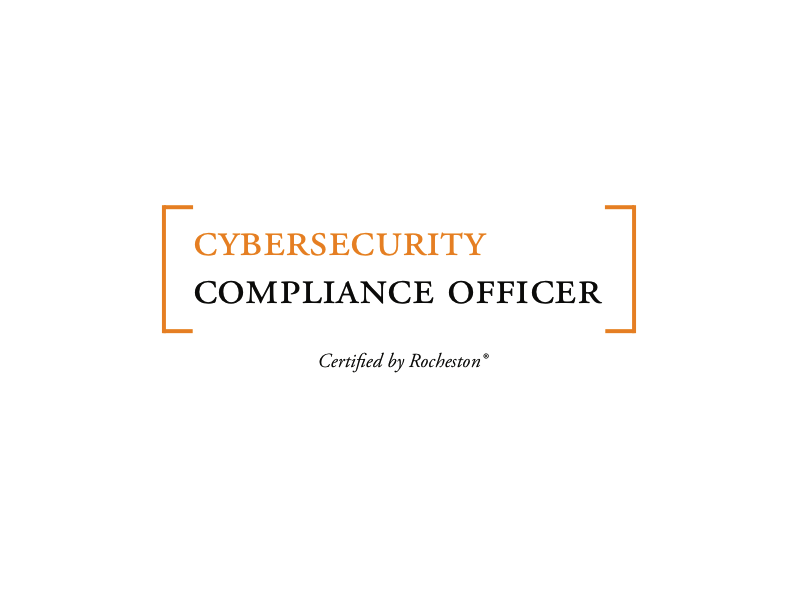Cybersecurity Compliance Officer (CCO) Certification
With the advent of Internet-of-things, and 24/7 businesses, the need for security and cohesion has never been greater. The consequences of having security loopholes are dire indeed, as it is not just the company’s confidential information that is affected. In business, companies deal with massive amounts of confidential data. Thus, as technology moves forward, there is a corresponding need to regulate security concerns as an ongoing process. This regulatory framework is compliance.
The process of continually planning, doing, checking, and acting has a dizzying amount of protocol, paperwork, and intricacies associated with it. Cybersecurity initiatives do not become viable until compliance is established.
Specialist training is required for individuals who desire to be cybersecurity compliance experts. Organizations need to employ a future-oriented approach when dealing with threats and vulnerabilities. The rise of cybersecurity concerns brings with it a need for protocol and strategies adapted to rectify these concerns. The rise in security loopholes and protocol has created an urgent need for a next generation course in compliance.
The demand for compliance experts is only expected to grow ex
potentially over the next decade. The Cybersecurity Compliance course is an ideal step-up for security professionals looking to broaden their professional horizons.
The phrase Information Security has been replaced by Cybersecurity. The CISO title needs an upgrade to CCO reflecting the changing threat landscape.
You have the CEO, CTO, COO, CIO and CFO management titles. It is time to add next generation cybersecurity management title CCO too.
Benefits of Cybersecurity Compliance
Compliance is a crucial part of modern-day tech security. Compliance can be defined as an entity’s ongoing adherence to a specific industry’s security rulesets, regulations, and obligations. More often than not, in industry, this is in the context of data and information security.
There are several motivations for an organization to stay compliant.
- CCOs deter potential legal consequences and massive lawsuits - Losing critical customer data is often a shameful event for any organization. The data being compromised and falling into the wrong hands is even worse. The legal ramifications to such data breaches can cost the company; even millions of dollars. Avoiding such messy lawsuits is a benefit of compliance. CCOs can weed out such issues at its root.
- Establish and retain the trust of your clientele. - Customers appreciate confidentiality and security. Your efforts to close any and all security loopholes will not go unnoticed.
- Do your company wonders - Prevention is better than cure. Flaunt your rock-solid security and build a positive brand reputation.
- Educate your employees - Educate your employees on their importance in the compliance process. Perks can be provided to individuals who religiously follow security protocol.
Governance: Managing Compliance
The recent cyber ecosystem has made cyber governance mandatory for both government organizations and private agencies.
The CCO courseware will acquaint the student with the different standards, regulations and protocols constituting the backbone for sustaining cybersecurity in specific industries. The next generation course would enable the student to become a strategic partner with major enterprises in information risk security.
The crux of cybersecurity compliance holds that the compliant officer be well-versed in the relevant cybersecurity policies and regulatory frameworks, and should ensure that the concerned organization abides by the respective protocols. Protocols permit markets to function evenly on the basis of mutual trust. Compliance is essential to address potential cyber threats, and vulnerabilities, and to sustain a secure system against malware, ransomware and other cyber-attacks.
The following are the cyber security policy frameworks providing necessary guidelines and regulatory requirements to secure data, information, networks:Management Title Cybersecurity Compliance Officer (CCO)
Information Security is replaced by Cybersecurity. Chief Information Security Officer title needs to be upgraded too.
Elevate your current CISO title to the next generation of cybersecurity leaders Cybersecurity Compliance Officer (CCO). The rules of engagement, policies, governance, devices, threats, attacks and technologies have evolved. What worked 3 years ago has become irrelevant today. Innovation in Cybersecurity is happening so fast you need to ride on this wave to succeed.
Artificial Intelligence, Deep learning, machine learning, Big Data, Cloud connected IoT, autonomous cars, quantum computing etc., are leading the next wave in Cybertech. It is time for you to evolve and reinvent yourself with new cybersecurity skills.
Join the new generation of cybersecurity management officers. Become a highly respected title Cybersecurity Compliance Officer (CCO). Equip yourself with the new title and you are ready for the future.Chief Cybersecurity Officer (CCO)
Become a Chief Cybersecurity Officer by enrolling into the Rocheston Certified Cybersecurity Compliance Officer (RCCO) Course. This course will equip you with skills for the next generation of cyberspace activities that the world is gearing up for.
The Chief Cybersecurity Officer is the most coveted position in every company, academic organization and government agency around the world, that is replacing all other courses in the cybersecurity domain.
As the cyberspace keeps evolving, it is important that organizations conform and adhere to the standards, regulations and requirements; as cyber technology will slowly take over and cybersecurity will become an essential part of life itself. Join this course to better equip yourself. The future is now!
Payment Card Industry Data Security Standard (PCI DSS)
Organizations involved in processing cardholder data should comply with the PCI DSS, developed in 2006 by giant companies like American Express, Visa, MasterCard, etc. The primary reasons for its foundation was
- To facilitate merchants and financial institutions to implement security standards that would insulate the payment systems from breaches.
- To help vendors implement standards for secure payment solutions.
The purpose of the PCI DSS is to protect cardholder data, and prevent data theft, by adopting globally consistent data securing guidelines. The extent of the company’s interaction with cardholder data will determine the level of compliance with the PCI DSS.
Developers, merchants, payment card-issuing banks usually comply with these standards.
The compliance officer will have to perform on-site security audits, quarterly network scans etc.
Sarbanes-Oxley Act (SOX)
As a result of the major corporation accounting scandals that took place in 2001 and 2002, the Sarbanes-Oxley Act was passed in 2002 to ensure that internal business processes of publicly-traded companies be adequately monitored.
The target is to protect financial data and counter fiscal fraud, by configuring Information Technology accordingly. The act requires companies to maintain financial records for a period of seven years.
The U.S. Securities and Exchange Commission (SEC), an independent federal government agency, has identified several key areas, including risk assessment and monitoring, where SOX compliance is required.
The compliance officer should ensure reliable financial reports by making use of various applications and processes.
Statement on Standards for Attestation Engagements No.16 (SSAE-16)
The SSAE-16 enforces controls with regards to financial reporting within business processes. It is a mandate within the SOX compliance. It offers guidelines for best practices in financial security and risk management.
Stakeholders need to review whether the necessary controls are in place.
The compliance officer should ensure that reports generated are in accordance with best practices.
NIST
The U.S. National Institute of Standards and Technology (NIST) collaborates with industry experts in addressing cybersecurity threats on critical infrastructure, i.e. the systems and processes that help the smooth running of the government.
The NIST guidelines are voluntary, although organizations could be required to follow the set of controls in order to attract partners and customers. NIST guidelines help reduce risks and enforce secure networks, as well as quality control.
Major enterprises could mandatorily leverage the framework to ensure protection against cyber-attacks.
The compliant officer would have to enforce the guidelines drafted in NIST 800-53 Risk Assessment RA 5 that outlines the frequency of scans, types of scanning required etc. He would also have to enforce the governing standards.
As part of the NIST, the National Initiative for Cybersecurity Education (NICE) framework coordinates between government, industry and academic partners to facilitate leadership, change and innovation. Within an ever-changing cyber network, it is essential to manage compliance. The NICE framework acts as a primary reference for recruiting workforce and organizing cybersecurity, bringing together public, private and academic sectors.
The NICE Framework has the following components:
- Categories: A grouping of common cybersecurity functions
- Specialty Areas: Specific areas of cybersecurity
- Work Roles: Lexicon of cybersecurity work describing the specific skills required in a work role.
Health Insurance Portability and Accountability ACT (HIPAA)
The HIPAA 1996 was passed by the U.S legislation under President Clinton, to protect medical information and maintain data privacy. The HIPAA framework offers the following facilities:
- Facilitates transfer and continuation of health insurance coverage even in the event of loss of or gap in jobs
- Reduces health care fraud and consequently, abuse
- Ensures privacy of health information
- Necessitates industry-wide standards for medical information
HIPAA requires its providers to ensure safety of confidential information. Moreover, users have to part with the least information that is required to go about their affairs.
Hospitals, medical care centers and insurance companies have to comply by this framework. The compliance officer should be assessing risk and ensuring that all the relevant criteria are adhered to.
International Organization for Standardization (ISO)
Information technology security and quality management controls are outlined by this standardization framework.
Manufacturing companies would need to look at sub-framework ISO 9000 for improved quality while for better information security, one should refer to sub-framework ISO-27000. Various ISO regulations protect data exchange and information that take place through online transactions.
Governments rely on ISO standards for improved regulations, quality products and services. ISO standards remain the lifeline for organizations around the world when it comes to protection of quality and information processes.
The compliant officer should levy the controls to check that they are in place.
EU General Data Protection Regulation (GDPR)
Personal information of EU citizens is protected by the GDPR, irrespective of where the organization is based, or where the data is located. By May, 2018, institutions across the world have to comply by the GDPR rules.
According to Article 5 of the GDPR, personal data will be:
- Processed lawfully, fairly, and in a transparent manner
- Collected for specified, explicit, and legitimate purposes
- Adequate, relevant, and limited to what is necessary
- Accurate and, where necessary, kept up to date
- Retained only for as long as is necessary
- Processed in an appropriate manner as to maintain security
The compliance officer has to ensure that the organization is abiding by GDPR rules.
Breach of data could lead to penalties up to €20,000,000 or 4% of worldwide annual turnover.
What is the need for a CCO title?
In the 21st century, technology is virtually ubiquitous. From smartphones to computers, the prevalence of technology in the hands of the commoner is more widespread than ever before. An unfathomable amount of data is transmitted over networks, both by organizations and individuals.
This transmission of massive amounts of data brings with it a certain set of challenges. Wherever there is data, there is a need for security. Organizations can ill afford to have their sensitive data compromised, and must employ preventive measures to avert and plug any security breaches. The reputation and safety perception of an organization hinges on their ability to lock down security protocol. This “locking down” and monitoring/analysis of security protocol is where compliance officers come into play.
CCOs are auditors for cybersecurity and compliance programs
Security threats are never static, and are constantly evolving. CCO-certified individuals are required to avert, identify, and rectify cyberattacks. Having a cybersecurity program with no compliance officer, could be compared to a football match with no referee.
CCOs can get personnel up to speed on requirements
Data breaches and security compromises from the inside, are just as harmful as threats from outsiders. Compliance officers should get employees up to speed on security awareness and protocol. Sessions should highlight security best practices on a recurring basis. An CCO certified professional is ideally equipped to provide insight into these best practices and evolving protocol.
Ongoing monitoring on a consistent basis is key
The availability of new technical tools for monitoring such as Archsight, Foglight, and Guardian require compliance officers to comprehend the data these utilities generate, along with their relevance to existing controls. Organizations are needed to be on their feet not just with regards to threats, but also with the tools that control and regulate these threats. It is not feasible to expect any random employee to be up to this task. Only an CCO can constantly be on the prowl for security breaches and updates, executing related tasks when necessary.
CCOs are required for System Security Plans (SSPs)
SSPs are compliance tools which are viewed as complex, intricate, and cumbersome to manage. However, correct documentation and analysis is required for proper implementation of any plan. It is indeed tragic that an organization could potentially deploy a half-baked plan due to a lack of properly trained compliance officers. SSPs should ideally be in line with a company’s cybersecurity framework. CCOs are ideally equipped to handle SSPs. Only an CCO can ensure that a company’s cybersecurity strategy is in line with its long term plans and objectives.
Who will use Cybersecurity Compliance?
- Industry standards compliance: Understand the use of key industry certifications and identify gaps, and provide training to enable certification.
- Adoption of best practices & Measuring controls against compliance: Aligning compliance practices, meeting applicable mandates and identify better opportunities, to align security vulnerabilities and compliance processes.
- Optimizing for the future: Development of a customized roadmap based on industry standards, defining your target and business priorities.
- Risk Management: Conducting risk assessments in accordance with guidelines developed by National Institute for Standards and Technology (NIST) and other frameworks.
- Aligning Security Programs with Best Practice: Perform assessment based on ISO 27002 security to identify areas and control requirements based on your information security program.
- Governance: Establishing a governance structure to monitor accountability for the organization’s cybersecurity program.
- Handle Breaches: Application of formal incident and escalation programs in response to breaches and notifying regulators and affected individuals as per policies.
- Testing: Periodical testing of cybersecurity programs.
What is the Role of an CCO?
Roles and Responsibilities of Cybersecurity Compliance Officer (CCO)/ Information Security Manager (CISM)/ Risk and Information Systems Control (CRIC)
The cybersecurity compliance officer’s role is to ensure protection, assess and manage risks, avoid lawsuits etc. Following best practices for businesses in different sectors and reducing threats makes the compliance officer’s role one of the most pivotal roles in the current cyber security scenario, globally.
The compliance officer brings to the table the following talents:
- Communicate risk and need for compliance to organizations and entrepreneurs, brief board members on cyber threats and attacks.
- Educate owners and managers, and determine which standards are applicable to the specific industry.
- Enforce guidelines of cyber risk management set in different globally recognized national and international standards and protocols, that are relevant to the particular industry, whether in banking and finance, healthcare or manufacturing.
- Appreciate that employee breaches could be a fundamental reason behind cyber risk and generate awareness on the need for ethical adherence to policies.
- Ensure that business owners, managers and employees understand the ethics and follow best practices for cybersecurity controls.
- Regular monitoring via internal on-site auditing, reviewing reports and access information, etc.
- Define third party responsibilities in terms of cyber security procedures, and strategize over necessary responses in the event of breach of privacy.
- Use cybersecurity assessment tools to identify breaches.
- Assess risk and create well-documented plan of action in case of an attack.
- Take necessary precautions to address cyber threats and vulnerabilities by generating awareness among stakeholders and leveraging relevant protocols before entering into partnerships.
- Collaborate with government and policy makers to ensure date protection and compliance.
- Continuous policy management, innovation and improvement of the compliance programme to keep up with evolving technology and possible threats that emerge subsequently.
- Review and develop information security policies, oversee vulnerability and penetration tests to avoid system breaches
- Identify and recommend measures to mitigate threats
- Design, implement and maintain cyber security plan for the enterprise
- Develop goals in accordance with regulations, plan ahead and allow for contingencies, become a strategic partner in a company’s cyber risk management practices.
- Represent national and international laws and regulations for the concerned enterprise, thus keeping it away from possible lawsuits.
- Prepare and manage compliance keeping in mind future risks.
Why is it Important to have an CCO?
In a world that is fast becoming defined by the virtual and the cyber rather than the real and the physical, it is important to understand, and address, the innumerable threats that lie within an ever-changing space.
As technology evolves, so does the possibility of cyber crimes involving hacking, malware, privacy breaches, data theft etc. The RCCO course will enable the student to gain expert knowledge and develop skills and techniques required to assess vulnerabilities and counter attacks.
The course will facilitate leadership in the cybersecurity field, and arm the student with knowledge to participate in cybersecurity assessment of enterprises in different sectors.
The officer can become a sought after strategic partner in cybersecurity controls for organizations.
Some of the major tech giants in the world such as Microsoft and Apple are investing heavily in and promoting cybersecurity as they understand the need for such measures, and of course, for compliance.
For instance, Microsoft has offered free cybersecurity tools to facilitate political campaigns during the upcoming midterm elections in the U.S.
Apple too, in collaboration with CISCO and Aon, has announced a new cyber risk management solution for organizations along with a cyber insurance coverage offered by Allianz.
Wannacry ransomware, the global cyber attack that hit 150 countries worldwide, is an example of the extent of cyber warfare in the current world. Malicious and much more lethal attacks are expected any moment since not just individual hackers but even governments are making use of highly advanced cutting edge technology to hack into the private information of other governments, launching malware to obtain data illegally.
At such desperate times, desperate measures are called for. Hence, compliance.
It is vital that the compliance officer or information security manager remain vigilant at all times, enforcing global standards, ensuring data protection and assuring governments and organizations of a smooth journey ahead.
In the light of this, the CCO course gains significance as a unique courseware that would equip the student to address the increasingly difficult information security controls in an increasingly complex cyberspace, overcome challenges and become an expert in a subject matter that is all set to revolutionize the world a few years from now.
What is the Future of CCO?
The changing scenario of cybersecurity has an impact on the risk management game categorically. Cyber-attacks are set to turn invisible, sophisticated and pervasive against prominent corporations, government utilities and devices. CCO will play a major role in determining the mode of approach towards cybersecurity compliance. They will also create a new risk management paradigm entirely as there would be several threshold issues that every organization will need to consider. Some of the future threats that would come under cybersecurity compliance are:
• Cloud Security
• Cryptojacking
• Worms
• IoT
• Data Breaches
How Rocheston Prepares you for CCO
The CCO curriculum has been created by subject matter experts (SMEs) of Rocheston, who have gone through extensive research to create content that is practical and connects perfectly with current industry standards. The program intends to equip you with ample knowledge to take on the changing cybersecurity scenario at compliance expertise with confidence and intelligence, that is necessary to take on the role of a cybersecurity compliance officer.
The program acts as a stepping stone for becoming an accomplished compliance officer in cybersecurity, who can turn tables at a dynamic organization with the acquired insights. The program teaches you about the best practices associated with security risks and developing information security programs and ensuring practices to adhere to compliance. The CCO course by Rocheston is a strong foundation for your career as a Cybersecurity Compliance Officer.
The CCO program
The course is a 5-day interactive learning capsule conducted in a seminar format by qualified engineers. It will be conducted every month in venues all over the world. Program participants can expect warm hospitality, as the sessions will be conducted in luxury star hotels with cutting edge facilities.
What the course will consist of:
• A 5-day Training Program
• Time: 9:30 AM – 6 PM
• The Provision of an Active Web Portal
• Seminars Conducted by Qualified Engineers
• In-class Environment
• Proctored Exam to Be Written on the Last Day on the VUE platform
Cost
Course Fee - USD 1299/-
Exam Fee - USD 799/-
Exam Retake Fee - USD 400/-





















